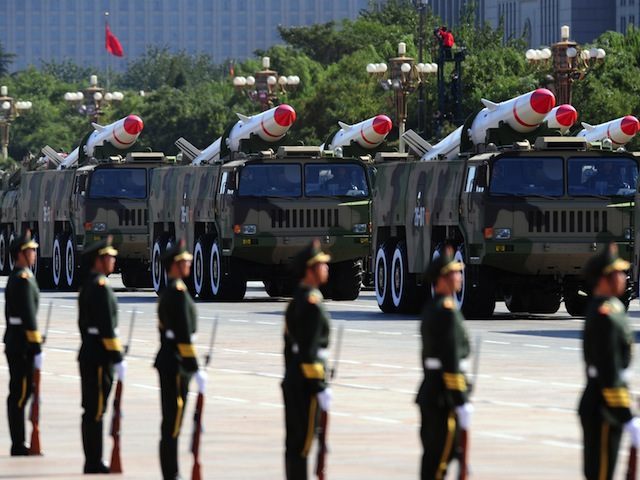China will “most likely” try to expand its military footprint in countries that share Beijing’s strategic interests and have long been considered its ally, namely Pakistan, as the communist country increases its “power projection into the Indian Ocean,” reports the Pentagon in an annual report to the U.S. Congress.
In the 97-page report issued Tuesday, the U.S. Department of Defense (DoD) warns under a subsection titled “Military Cooperation”:
As China’s regional and international interests grow more complex, the PLA’s [People’s Liberation Army] international engagement will continue to expand, especially in the areas of PKO [peacekeeping operations], counterpiracy, HA/DR [humanitarian assistance/disaster relief, counterterrorism, and joint exercises.
The Pentagon later adds that “China most likely will seek to establish additional military bases in countries with which it has a longstanding friendly relationship and similar strategic interests, such as Pakistan, and in which there is a precedent for hosting foreign militaries.”
In August 2016, Beijing reached a military counterterrorism pact with Afghanistan, Pakistan, and Tajikistan.
Beijing believes terrorism, primarily stemming from Pakistan and, to a lesser extent, war-ravaged Afghanistan, poses a threat to China’s One Belt, One Road (OBOR) initiative, known as the 21st Century Silk Road project.
As of 2015, China was the globe’s fourth-largest arms supplier, with Pakistan being one of its top customers. Pakistan receives more weapons from China than any other country.
“China is one of only a few global suppliers of such [armed unmanned aerial vehicles — UAV] equipment and faces little competition for sales to the Middle East and North Africa,” notes the Pentagon. “This likely will result in the Middle East and North Africa surpassing Sub-Saharan Africa as China’s second largest arms export market.”
Pakistan and China, which consider India to be their regional foe, have agreed on the construction of the estimated $55 billion China-Pakistan Economic Corridor (CPEC), a component of Beijing’s nearly $1 trillion modern Silk Road, officially known as Chinese President Xi Jinping’s OBOR initiative.
It appears China is using its OBOR project as justification to expand its military footprint to many of the 60 countries in Asia, Europe, the Middle East, and Africa that are involved in the ambitious project.
Leaked documents recently obtained by Pakistan’s DAWN purportedly revealed that Beijing is planning to use CPEC to suppress Islamic terrorism, diversity, and democracy in its Muslim-majority ally.
It appears China is seeking to expand its military might beyond neighboring Pakistan and Afghanistan across various other countries.
“China’s overseas military basing may be constrained by the willingness of countries to support a PLA [People’s Liberation Army] presence in one of their ports,” it adds.
Pakistan, the top recipient of Chinese weapons as well as other military assistance and foreign aid, is already collaborating with Beijing’s military ambitions.
With Pakistan’s blessing, China has deployed naval ships to the Singapore company-run Gwadar Sea Port to safeguard the port and trade under the China-Pakistan Economic Corridor.
From Gwadar port, China’s area of operation would include a region from the Arabian Sea to the African coast, and, of course, the Gulf would be its area of operation.
India is opposed to China’s plan to set up military bases within its periphery.
Nevertheless, China has already begun to establish military bases in the Indian Ocean, namely Djibouti and in the Gwadar port in Pakistan’s Balochistan province.
As has been Beijing’s policy for a long time, China’s goal is to isolate India.
In the Indian Ocean, China intends to construct a military base network that would include Bangladesh, Sri Lanka, the Seychelles, and Djibouti, among others.
The Pentagon reports:
In May 2016, a large PLAN [PLA Navy] task force conducted an extensive deployment through the South China Sea, eastern Indian Ocean, and Western Pacific Ocean. The force conducted island assault training in the Spratly Islands and maritime interdiction training in the Indian Ocean before linking up to conduct an opposition-force exercise in the Philippine Sea.
DoD also notes:
China also continued to send submarines to the Indian Ocean, ostensibly in support of its counterpiracy patrols. In May 2016, a nuclear- powered attack submarine conducted a port call in Karachi, Pakistan, during a visit by the PLAN Commander, marking China’s first port call in South Asia by a nuclear submarine. These submarine patrols demonstrate the PLAN’s emerging capability both to protect China’s SLOCs [sea lines of communication] and to increase China’s power projection into the Indian Ocean.
In what seems to be a pushback to China’s ambitious OBOR project, India and Japan are embarking upon multiple infrastructure projects across Africa, Iran, Sri Lanka, and Southeast Asia.
Last month, the Economic Times noted, “India has conspicuously stayed away from the so-called New Silk Road, launched with much fanfare by Chinese President Xi Jinping on Sunday, because of strategic and security concerns.”
The China-Pakistan Economic Corridor is expected to run through the disputed Pakistan-occupied Kashmir (POK), a move that will certainly cause tension with India since New Delhi claims ownership of the region.
China considers the growing Islamic terrorism threat it is facing to stem from Pakistan and to a lesser extent Afghanistan, according to the U.S.-China Economic and Security Review Commission.
Beijing and Kabul have already signed a memorandum of understanding (MOU) to integrate Afghanistan into the 21st Century Silk Road.
Pakistan-occupied Kashmir and Afghanistan border China’s autonomous and largest Xinjiang province, home to the country’s Muslim Uighur minority.

COMMENTS
Please let us know if you're having issues with commenting.